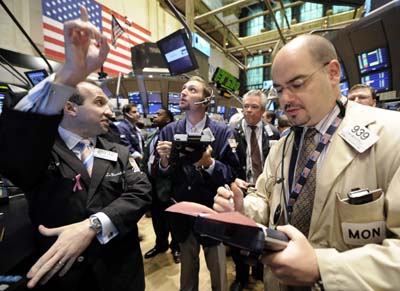
The hope on the Street was that the market was finding a bottom
after eight sessions of devastating losses that sent the Dow down
nearly 2,400 points.
TIM PARADIS – AP Business Writer
NEW YORK
Wall Street snapped back from last week’s devastating losses after major governments announced further steps to support the global banking system, including plans by the U.S. Treasury to buy stocks of some banks. All the major indexes rose well over 6 percent, and the Dow Jones industrials gained 500 points.
The hope on the Street was that the market was finding a bottom after eight sessions of devastating losses that sent the Dow down nearly 2,400 points. But while a rebound had been expected at some point, Wall Street can expect to see volatile, back-and-forth trading in the coming days and weeks as investors work through their concerns about the banking sector, the stagnant credit markets and the overall economy.
But the market did appear to take heart when the Bush administration said it is moving quickly to implement its $700 billion rescue program, including consulting with law firms about the mechanics of buying ownership shares in a broad number of banks to help revive the stagnant credit markets and in turn get the economy moving again.
Neel Kashkari, the assistant Treasury secretary who is interim head of the program, said in a speech Monday officials were also developing guidelines to govern the purchase of soured mortgage-related assets. However, he gave few details about how the program will actually buy bad assets and bank stock.
Jim King, chief investment officer at National Penn Investors Trust Co., said the fear that took hold of the markets was overwrought.
“Our position is that the fundamental values never went away in the first place and that we have exceptional companies at fire sale prices,” he said.
Still, King cautioned that any market rebound likely will be choppy.
“Even if this is the beginning of a recovery we’re not just going to have up markets from here on in,” he said. “We’re not through the woods. We think there is collateral damage from this debacle.” King pointed to an increase in unemployment and nervousness among consumers that could, for example, hurt retailers and in turn, take stocks lower.
In late morning trading, the Dow Jones industrial average rose 525.68, or 6.22 percent, to 8,976.87.
Broader stock indicators also jumped. The Standard & Poor’s 500 index advanced 55.89, or 6.22 percent, to 955.11, and the Nasdaq composite index rose 104.57, or 6.34 percent, to 1,754.08.
Investors also reacted to word from the Bank of England that it would use up to $63 billion to help the three largest British banks strengthen their balance sheets.
The Bank of England, the European Central Bank and the Swiss National Bank also jointly announced plans to work together to provide as much short-term funding as necessary to help revive lending.
After a series of weekend meetings in Washington of heads of the Group of Seven nations, the gains in global markets signaled that investors found comfort from the actions and pledges coming from government officials.
The surge in stocks comes after a dismal week on Wall Street that erased an estimated $2.4 trillion in shareholder wealth. The Dow, after eight consecutive daily losses that totaled just under 2,400, or 22.1 percent, finished at its lowest level since April 2003, and also suffered its worst weekly percentage loss ever, a fall of 18.2 percent.
Meanwhile, the S&P 500 and the Nasdaq each lost 15.3 percent last week.
Investors have worried that banks’ reluctance to lend to one another would imperil economic activity by making it harder and more expensive for businesses and consumers to get a loan.
“Everybody is basically waiting on the decision on where they’re going to inject cash,” Dave Rovelli, managing director of U.S. equity trading at Canaccord Adams in New York. He said with the bond markets closed for the Columbus Day holiday, U.S. government officials are likely holding off on announcement of details about where it might invest money until all major global markets are open.
Rovelli said that a sustainable advance on Wall Street could prove elusive.
“Everybody knew that we were going to have an up day eventually,” he said, warning that the rally doesn’t necessarily signal an end of the market’s troubles.
Early Monday, Wall Street found some relief from Mitsubishi UFJ Financial Group’s announcement that it closed on its $9 billion investment in Morgan Stanley a day earlier than expected. Morgan Stanley lost nearly 60 percent of its value last week as investors worried that the deal would fall apart. The agreement gives Morgan a much-needed injection of cash.
Morgan Stanley rose $5.44, or 56 percent, to $15.12.
The dollar was mixed against other major currencies, while gold prices fell.
Light, sweet crude rose $3.06 to $80.76 on the New York Mercantile Exchange after oil fell to its lowest level in 13 months last week.
Advancing issues outnumbered decliners by about 10 to 1 on the New York Stock Exchange, where volume came to 624.4 million shares.
The Russell 2000 index of smaller companies rose 25.78, or 4.94 percent, to 548.30.
Investors in Asia and Europe also grabbed stocks after last week’s rout and the weekend moves by governments to bolster investor confidence.
In Asia, Hong Kong’s Hang Seng index surged 10.2 percent. Markets in Japan were closed for a holiday. In Europe, Britain’s FTSE 100 jumped 5.41 percent, Germany’s DAX index rose 9.93 percent, and France’s CAC-40 jumped 8.54 percent.








